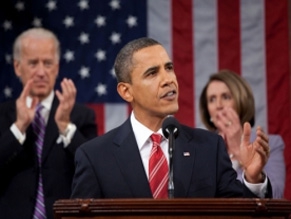|
World Jewish News

President Obama's first State of the Union address
(White House / Pete Souza, photo by JTA.org)
|
Obama’s speech: No details on Iran or mention of Mideast peace
28.01.2010, Israel and the World Jewish groups say the liked what they heard in President Obama's first State of the Union address but are reserving final judgment until they hear more specifics.
It's not that Obama failed to offer details. It’s just that the details mostly had to do with his economic recovery plans, which took up the bulk of his speech.
On two issues of great concern to Jewish groups -- health care and the Iran threat -- Obama confined himself mostly to generalities and platitudes. And the president did not mention Middle East peacemaking at all.
On health care, the issue that has consumed much of Obama's political capital in his first year in office, the president acknowledged that he was to blame in part "for not explaining it more clearly to the American people." But Obama dispensed with the subject with little more than an appeal to Republicans to make their health reform plans known and a pledge not to "walk away" from health care.
On Iran, Obama promised "growing consequences" to Iran's leaders for ignoring international demands for greater nuclear transparency. But he pointedly did not spell out what these consequences might be.
Dan Mariaschin, the executive vice president of B'nai B'rith International, found both elements wanting.
"It's clear that the president is looking to move forward and also looking to achieve a compromise which will allow some kind of legislation to be adopted," Mariaschin said on health care reform.
Mariaschin, whose group occupies a lead Jewish role in advocating for the elderly, said it was not clear whether the legislation that would emerge from such a compromise would hang together.
"The pieces have to fit together -- it needs to be cohesive and comprehensive," he said.
On Iran, Mariaschin echoed the discomfiture that has permeated the pro-Israel community about Obama's consistent avoidance of the "S" word in recent months.
"The word 'sanctions' wasn't mentioned," he said.
The sanctions issue could come to a head in coming weeks, with the U.S. Senate considering a broad sanctions bill already passed by the House of Representatives and the U.N. Security Council getting set to consider a fifth package of sanctions.
Jewish groups active on domestic economic issues found more substance in the speech.
Aside from proposing fees for the biggest banks, Obama talked about funneling $30 billion that major banks have repaid in bailout loans to small businesses to spur job creation. He also wants to build more high-speed rail and advance the domestic manufacture of clean energy products.
"His commitment to building infrastructure in terms of alternative energy, education, community banks -- these address short-term and long-term concerns of the Jewish community," said Rabbi David Saperstein, the director of the Reform movement's activist arm, the Religious Action Center.
William Daroff, who directs the Washington office of the Jewish Federations of North America, said the overall package -- jobs creation underpinned by a safety net of guaranteed health care -- coincided with Jewish concerns that more Americans are falling through the cracks.
Still, Daroff said he wants more details on how the administration plans to assist social service groups that are running out of funds. Such details may appear in Obama's budget proposal, which is due by next week.
"For Jewish federations tackling the crisis in social services, dealing with vulnerable populations hit by the economy, we're encouraged by a jobs bill that would have safety net assistance," Daroff said. "The biggest takeaway is that there's an incredible need by social service agencies."
Noting the recent proliferation of violent attacks by loner extremists, particularly on Jewish targets, Daroff said he hoped the administration would keep up security assistance for nonprofits.
Jewish groups praised Obama's commitment to creating clean energy jobs, which dovetails with longstanding Jewish concerns that America is overly dependent on foreign oil supplies.
"If there is a program going forward that frees us from the yoke of foreign oil, we would be supportive," Mariaschin said.
Daroff said he was glad Obama was breaking Democratic taboos and considering energy alternatives that would appeal to Republicans, including drilling in domestic waters and developing coal technologies.
"I was impressed by the nods to the Republicans," said Daroff, a former Republican operative.
Saperstein said the speech serves as a reminder that the Jewish community should be concerned about nuclear proliferation generally, not just with regard to Iran. In his speech, Obama proposed arms controls and reducing nuclear stockpiles.
"Broader proliferation remains an enormous threat to Israel and America's security, regardless of what happens with Iran," Saperstein said, noting the potential for terrorists to acquire weapons. "The Jewish community has not always been engaged as it should."
JTA
|
|
